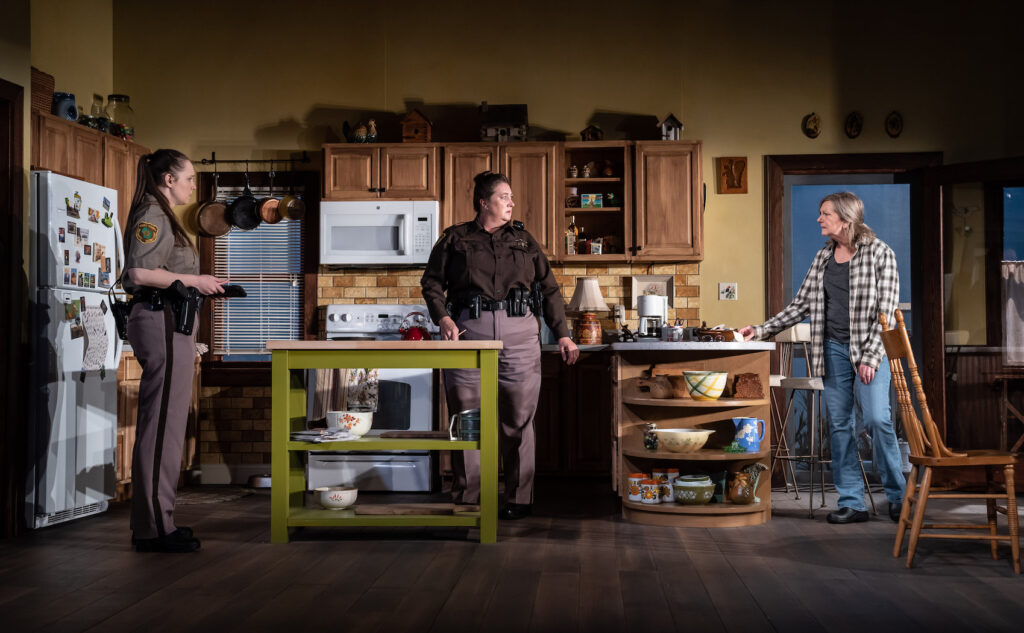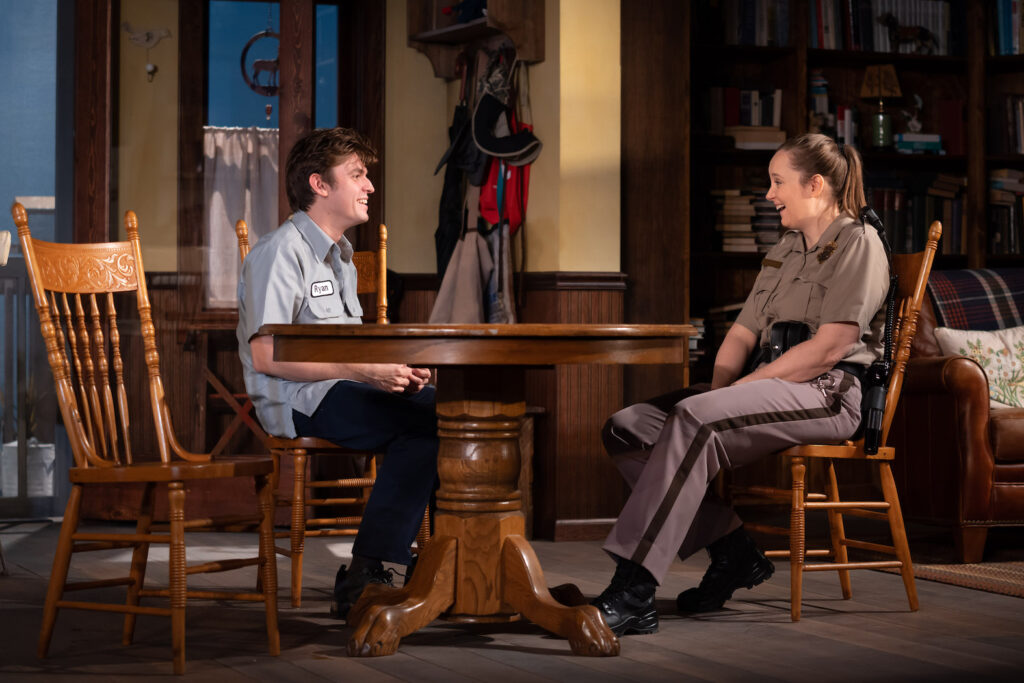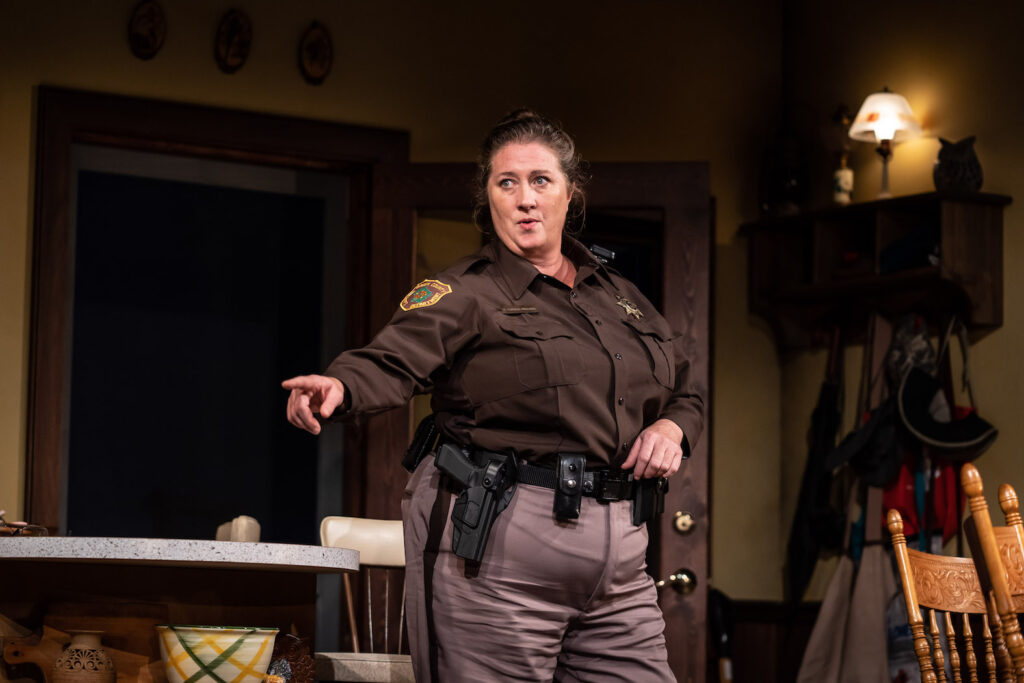By Samuel L. Leiter . . .
In a number of ways, Swing State, Rebecca Gilman’s (Spinning Into Butter) often compelling, well-acted drama being presented by Audible at the Minetta Lane, resembles any number of 1950s kitchen sink dramas, especially those set in rural locales. Its naturalistically detailed interior setting, well-made structure, local character types, sense of the natural environment, and domestic issues of family life and death have a familiar look and sound. Of course, plays back then never were intermissionless hour and 45-minute one-acts, profanity was radically limited, and casts rarely were limited to a mere four characters.
Swing State, set in the summer of 2021 during the Covid pandemic, makes its chief claim to contemporaneity in its concern for topics of current environmental importance; these offer a colorfully informative background that enlivens what otherwise might be a well-crafted, but not especially unique, domestic drama centered on issues of human communication and mutual caring flavored with concerns about grief, suicide, law enforcement, and substance abuse. It’s all topped off with a denouement marked by a violent surprise that seems more theatrically contrived than organically convincing, yet, in the scheme of things, is probably unavoidable. Other critics have explained the play’s contents and title via varying metaphors, but Gilman herself never indulges in such speculative thinking during the play.

Peg Smith (Mary Beth Fisher), a politically liberal—she ended her subscription to the local newspaper when it endorsed Trump—65-year-old former guidance counselor and sometime Health Science teacher, lives in a renovated farmhouse on 48 acres of prairie in rural Wisconsin. Grieving for her late husband, Jim, a natural biologist, dead a year, she occupies herself as best she can, seeking to maintain the surrounding flora and fauna (notably bats and birds); we hear occasional earfuls about the ecological tragedy stemming from toxic chemicals used in nearby agriculture. A notable feature of Todd Rosenthal’s impressively detailed set is a water cooler, used because drinking the tap water is an invitation to colon cancer.
Peg’s chief personal relationship is with troubled 26-year-old Ryan Severson (Bubba Weiler), whom she has known since he was six, and who, after three years in prison for battery, drives a bread truck; his own parents having been irresponsible, Peg and Jim served as loving surrogates. Peg continues to serve him in this capacity despite his obvious insecurities and panic attacks.


The other characters are a bullying, middle-aged, female sheriff, Kris (Kirsten Fitzgerald), whom Peg considers fascistic, thus marking the play’s inherent political divide, and Kris’s empathetic, 27-year-old niece, Dani (Anne E. Thompson), whom the elected sheriff has appointed her deputy, in order to give her a clear purpose in life. Peg resents Kris’s aggressive officiousness, especially because the sheriff’s family, the Callahans, own the surrounding land and want to buy Peg’s acreage, which they will further despoil. Much more sympathetic is the “good cop” Dani, recently divorced from her cheating spouse; she knew Ryan in school, and when they’re alone a whiff of potential romance arises, deepening the irony of the play’s conclusion.
The inciting incident, as they call it in well-made plays, which appears in the second of the play’s seven scenes, is Peg’s report of a stolen trunk of Jim’s antique tools and, with it, the disappearance of his Winchester 94 rifle. The principal tension in the play relates to the investigation of the gun’s whereabouts, the chief suspect, and the reason behind its theft.


Tight as the writing is generally, the exposition is sometimes too obvious when it’s information one would imagine the recipients should already know. Questions could also be raised about significant things Ryan is said to have reported to friends; his having said these things doesn’t pass the plausibility test. And a bit too much time is devoted to filler dialogue providing local color that, while interesting, does little to forward the largely uncomplicated dramatic action.
Rosenthal’s livable-looking set (deliberately absent a TV), gently lit by Eric Southern, occupies the entire width of the Minetta Lane stage, with a book-lined study/parlor at our right, dining area (and main entrance) at center, kitchen and entrance to upstairs at left. Nothing distracts from the believability of Evelyn Danner’s costumes, from the quotidian garments of Peg and Ryan to the uniforms of Kris and Dani.
As performed under the perspicacious direction of distinguished veteran Robert Falls, Swing State is a fine character study, with each actor—they created their roles in its premiere at Chicago’s Goodman Theatre—carving out a clearly limned portrait. Fisher is outstanding as the maternal, salty-tongued, sensitive naturalist, preoccupied both with humankind’s responsibility for destroying the natural world and with the difficult young man whose well-being she’s chosen to oversee, and whom she’s chosen to occupy her place after she’s gone.


Weiler has perhaps the most physically active role, with his anger, fear, and vulnerability frequently on display; it requires, though, much emoting, which sometimes bleeds into overacting, throwing the onstage naturalism slightly off balance. Fitzgerald, physically imposing, is the purported villain, viciously demeaning Ryan; since Kris has personal reasons for her animus, however, she manages to make the sheriff’s behavior human enough to at least warrant understanding rather than outright anger. And, to the most understated role, Dani, the unassuming deputy, Thompson brings a marvelously subtle kindness, innocence, and humor; one of her lines draws the biggest laugh of the show.
Swing State nonetheless is a worthwhile addition to the young season. Its positive reception, in fact, has led to its limited run being extended. Given its realistic premises and topicality, I wouldn’t be surprised if it were adapted for film or TV purposes.
Swing State. Through October 28 at the Minetta Lane Theatre (18 Minetta Lane between MacDougal Street and Sixth Avenue, Greenwich Village). www.swingstateplay.com
Photos: Liz Lauren


















